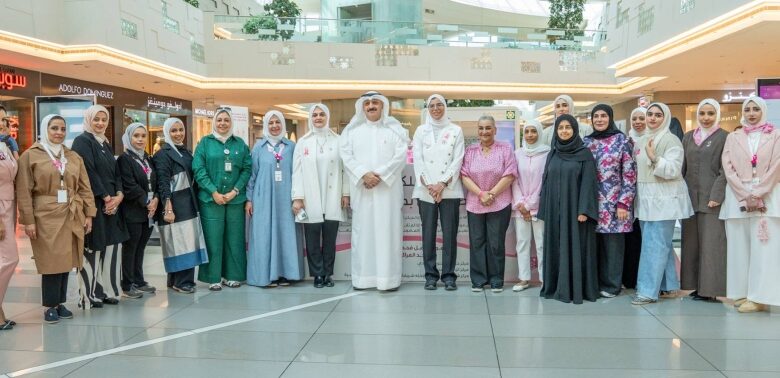Early breast cancer detection benefits thousands in Kuwait

Dr. Ahmed Al-Awadhi, Minister of Health, said that the National Program for Early Detection of Breast Diseases has received about 40,000 women since its launch in 2014.
In this period, about 400 cases of cancer were discovered after a mammogram, stressing that early detection helps increase the recovery rates to about 98 percent.
During the awareness day held by the Ministry of Health at the Avenues Mall under the slogan, “Check now…means safety” as part of the ministry’s activities to raise awareness of breast cancer and combat it, Al-Awadhi told the Kuwait News Agency that this national program is one of the ministry’s most important programs to combat cancer and detect it in its early stages before reaching advanced stages.
Dr. Al-Awadhi pointed out the Ministry’s keenness to provide mammography examination centers in various governorates of the country, in addition to all hospitals, throughout the year.
It is a health program for the prevention and combating of breast cancer by conducting an early diagnostic survey of breast tumors among women in the age group of 40 years and above, through a high-quality examination.
He added that the program, “which we are proud of, provides a diagnostic breast scan with the aim of early diagnosis of cancerous tumors. The periodic examination includes a mammogram and may involve a clinical medical examination performed by the family physician and self-examination of the breast.”
Al-Awadhi stressed that treating cancer patients is at the top of the Ministry’s priorities. This shows great interest in combating it and has developed various programmes in terms of early detection, treatment and support for scientific research, in addition to the interest it pays to the drug security system and works to provide medicines, including cancer medicines, despite their specificity and diversity.
He also pointed out the keenness to organize awareness programs, which are an integral part of the Ministry of Health’s role in educating members of society and detecting the disease in its early stages to facilitate treatment.
On the other hand, Dr. Asmaa Al-Hussein, Head of the National Program for Early Detection of Breast Diseases, stressed the Ministry’s eagerness and commitment to participate with the world in celebrating Breast Cancer Awareness Month by holding such awareness programs in (Pink October).
She pointed out that the program centers are spread across most of the country’s governorates, “there are Al Zahra, Al Naeem, Southern Khaitan, Surra, and Al Aqila centers,” where women within the target group are received under conditions including that the woman does not suffer from symptoms and is not pregnant or breastfeeding. She books an appointment through the (Sahl) and (Kuwait Health) programs and then reads the mammogram at the main center.
Dr. Asmaa explained that if there is a need for any additional tests, then they are performed at the main center until a diagnosis is reached. After that the patient is referred to the appropriate authority, in addition to the program’s mission to increase awareness among community members of the factors that may contribute to breast cancer.
She pointed out the importance of early examination and its role in achieving successful treatment rates, highlighting that most studies indicate that early examination to detect the disease in its early stages, helps increase recovery rates and shorten the treatment period.
Whereas, Dr. Buthaina Al-Kandari, Head of the Radiology and Radiotherapy Departments Council, Vice President of the Program, and Head of the Technical Committee, said that the aim of today’s celebration is to increase women’s awareness of the importance of regular mammogram screening, which takes no less than half an hour, noting that screenings are available throughout the year.
Al-Kandari called on women to undergo periodic examinations that allow for early diagnosis of small tumors before symptoms appear.
The earlier the disease is discovered, the greater the chances of successful treatment. The earlier the discovery is in the early stages, the more options there are for treatment methods and complete recovery, she said.
On a similar note, Dr. Latifa Al-Kandari, Head of the Radiology Department at Al-Adan Hospital and a member of the program’s Supreme Committee pointed out a number of misconceptions that are being circulated on social media, including that a mammogram examination may cause thyroid cancer or its spread if it is present.
Dr. Latifa explained that such talks are completely false, confirming the safety of mammography examinations, “and that mammography exposes small amounts of radiation that do not have any negative effects,” noting that the benefits of mammography outweigh any potential harm from exposure to radiation.











